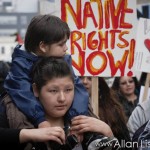Ontario and Canada Appeal Grassy’s Landmark Treaty Rights Legal Ruling
 Today the Government of Ontario begins proceedings in the Ontario Court of Appeal seeking to overturn a major legal victory for Grassy Narrows Indigenous Nation in their decade long battle for Treaty rights and against clearcut logging on their territory – a practice known to raise mercury levels in fish.
Today the Government of Ontario begins proceedings in the Ontario Court of Appeal seeking to overturn a major legal victory for Grassy Narrows Indigenous Nation in their decade long battle for Treaty rights and against clearcut logging on their territory – a practice known to raise mercury levels in fish.
RELEASE
Ontario appeals landmark Native Treaty rights legal ruling in battle over clearcut logging in Grassy Narrows
(Toronto) – Today the Government of Ontario begins proceedings in the Ontario Court of Appeal seeking to overturn a major legal victory for Grassy Narrows Indigenous Nation in their decade long battle for Treaty rights and against clearcut logging on their territory – a practice known to raise mercury levels in fish above safe levels. On August 16, 2011 Ontario Superior Court Justice Saunderson found that the Government of Ontario does not have the power to unilaterally take away the rights promised in Treaty 3 by authorizing industry including logging and mining. That judgment came after 11 years of legal process in Keewatin v. MNR.
“Our community has suffered for too long from the impacts of industry imposed on our people,” said Joseph Fobister, one of the Grassy Narrows trappers who initiated the legal action. “We cannot allow industry to further damage our way of life and our health by poisoning our water and destroying the forests that we depend on.”
In her judgment Justice Saunderson wrote:
“I am of the view it would violate the Honour of the Crown were Ontario to now continue to ignore the process clause that I found was deliberately inserted by the Commissioners to protect Treaty Harvesting Rights. Having been unsuccessful, I am firmly of the view that [Ontario] should now, to use the words of Binnie J. in Mikisew at paragraph 63, ‘get on with performance.’” [1625]
Instead, Ontario is appealing the ruling arguing that Ontario has “exclusive proprietary jurisdiction over public lands and forests in the province" [387], calling the trial judge’s analysis the "antithesis of reconciliation" [392], and claiming that implementing the judgment "would needlessly hamper the economy” of the region [393].
In her 2011 ruling Justice Saunderson had harsh words for Ontario’s approach to Treaty rights:
“Ontario's approach to this litigation, while pleasantly civil, was strongly adversarial. Always focusing on its own proprietary rights, it downplayed the plain and clear reference in the Harvesting Clause to Canada. It characterized as a "mistake" what I have found to be [the Treaty Commissioner’s] deliberate attempt to protect the Harvesting Rights of the Ojibway…” [1603]
“Here, Ontario was asking this Court to interpret the Harvesting Clause in a manner contrary to the plain meaning of the Treaty words, to benefit itself by expanding its s. 109 rights while restricting Ojibway rights validly conferred under s. 91(24).” [1604]
“It is time for Ontario to finally stop wasting time and money trying to force damaging clearcut logging on our community, and to begin the process of reconciliation by respecting our Treaty and aboriginal rights as we defend our forest-based way of life,” said Grassy Narrows Chief Fobister.
On December 7, 2011 the government of Ontario agreed not to allow logging without the consent of Grassy Narrows in a vast part of Grassy Narrows Territory in the Whiskey Jack Forest north of the English River while the appeal of Keewatin v. MNR is underway. The agreement is given force by an order of Justice Feldman of the Ontario Court of Appeal. It applies to an area that is nearly half of Grassy Narrows Territory, and approximately six times the size of the city of Toronto.
Logging in the Grassy Narrows Territory has been mostly suspended since AbitibiBowater surrendered their license in June 2008 under intense pressure from grassroots blockades, boycotts, and legal action. However, the new Whiskey Jack Long Term Management Direction, made public iby Ontario in Dec. 2011 without Grassy Narrows' support, plans for many large clearcuts on Grassy Narrows Territory north and south of the English River over the next ten years. Grassy Narrows holds that industrial activity which can permanently impact their aboriginal and Treaty rights must respect their right to say ‘no’ as recognized by the UN Declaration on the Rights of Indigenous Peoples.
The Attorney General of Canada, and Resolute FP Inc. (formerly Abitibi-Bowater Inc.) are also appealing. The Grand Council of Treaty 3, Goldcorp Inc., and a number of other First Nations are intervening.
Location: Ontario Court of Appeal, Osgoode Hall, Courtroom One.
For Further Information Contact:
|
Chief Simon Fobister: 807-407-0170 Joseph Fobister: 807-407-2745 |
Robert Janes: 250.888.5269 rjanes@ jfklaw.ca |
For copies of the facta from all parties contact: riverrun2010@gmail.com
For more information on Keewatin v. MNR click here.




